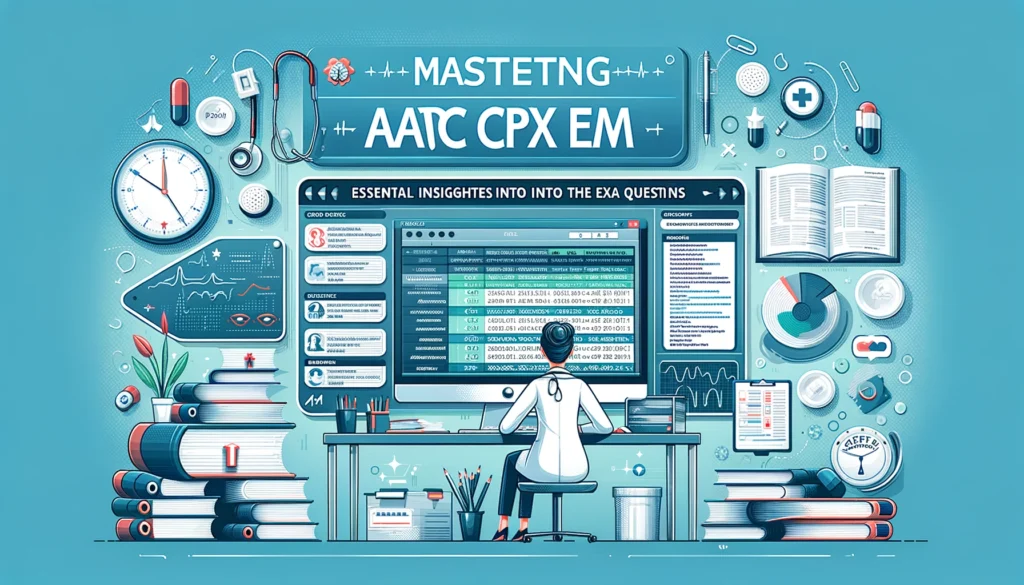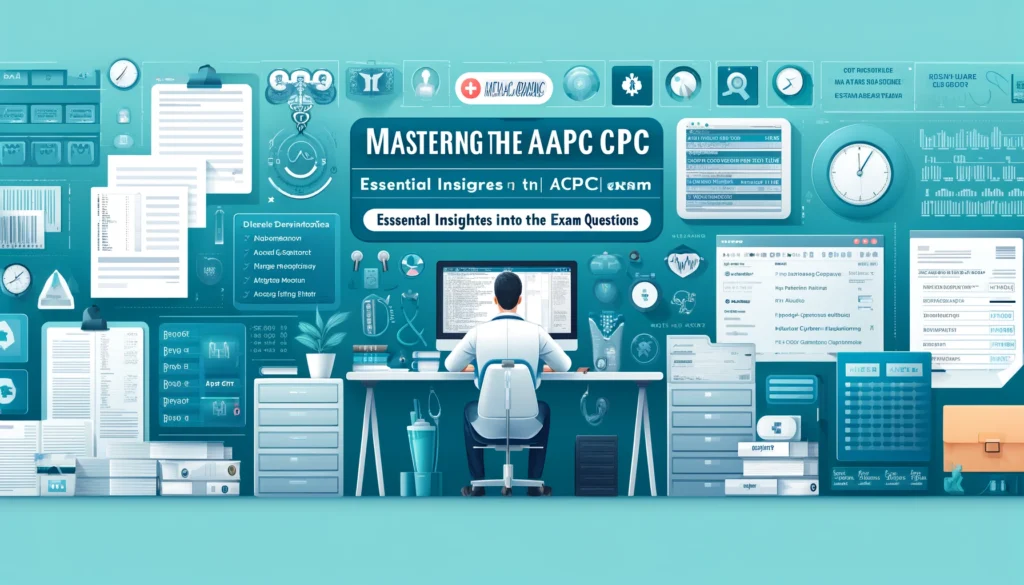The AAPC CPC (Certified Professional Coder) exam is a significant hurdle for aspiring medical coders seeking to validate their skills and launch successful careers. Earning your CPC credential signifies expertise in medical coding, a critical skill within the healthcare industry. This comprehensive guide delves deep into the AAPC CPC Exam Questions, equipping you with insights into the format, content areas, and strategies for tackling the exam questions with confidence.
Introduction
The Certified Professional Coder (CPC) exam by the American Academy of Professional Coders (AAPC) is a benchmark for proficiency in medical coding across various healthcare settings. With the healthcare industry growing and evolving, the demand for skilled and certified coders has never been higher. This blog provides a comprehensive overview of the AAPC CPC Exam Questions, focusing specifically on the types of questions you can expect, the format of the exam, and effective strategies for preparation.
Table of Contents
Understanding the AAPC CPC Exam
The CPC exam is designed to test a candidate’s knowledge and proficiency in medical coding. The exam covers a wide range of topics, including coding guidelines, the correct application of codes (ICD-10-CM, CPT, HCPCS Level II), and billing procedures. This ensures that a certified coder can handle coding demands in a real-world medical setting.

The AAPC CPC Exam Questions is a computer-based test administered by the AAPC (American Academy of Professional Coders). It assesses your proficiency in various medical coding domains, including:
- Anatomy & Physiology: Understanding the human body’s structure and function is crucial for accurate coding.
- Pathology & Diagnosis: Knowledge of diseases and medical conditions allows you to interpret physician documentation and select appropriate codes.
- Medical Terminology: Familiarity with medical terminology is essential for deciphering physician notes and reports.
- Coding Systems: Mastering coding systems like CPT® (Current Procedural Terminology), HCPCS (Healthcare Common Procedure Coding System), and ICD-10-CM (International Classification of Diseases, Tenth Revision, Clinical Modification) forms the core of medical coding expertise.
- Coding Compliance & Guidelines: Adherence to coding guidelines and regulations ensures accurate and compliant submissions.
Exam Format and Structure
- Length and Timing: The CPC exam comprises 150 multiple-choice questions, which candidates need to complete within 5 hours and 40 minutes. This time frame challenges the coder’s ability to manage time efficiently while demonstrating coding proficiency.
- Content Areas: The questions are distributed across various sections that mirror the coder’s expected knowledge and skills areas. These include:
- Surgical coding
- Radiology
- Pathology
- Medicine
- Anatomy and Physiology
- Medical Terminology
- Coding Guidelines
- Compliance and Regulatory
The exam format typically consists of multiple-choice questions, with some exams incorporating select-all-that-apply or case studies. The specific number of questions and allotted time may vary slightly depending on the exam version.pen_spark
Types of Questions on the AAPC CPC Exam Questions
- Scenario-Based Questions: These questions test the coder’s ability to apply coding knowledge in practical, real-life situations. They often require more time to answer as they involve reading and interpreting documentation to choose the appropriate codes.
- Knowledge-Based Questions: These are designed to assess the coder’s understanding of coding rules, medical terminology, and anatomy and physiology.
- Multiple-Choice Format: All questions in the CPC exam are multiple-choice, providing four options each. This format tests both depth of knowledge and the ability to critically eliminate incorrect answers.
Preparation Tips for the AAPC CPC Exam Questions
- Comprehensive Study: Invest in the latest AAPC study materials and official CPC certification study guides. These resources are updated to reflect the latest coding standards and exam format.
- Practice Tests: Regularly completing practice exams is crucial. These tests simulate the actual exam environment and help build accuracy and speed.
- Coding Manuals: Familiarize yourself with the ICD-10-CM, CPT, and HCPCS Level II coding manuals. Knowing how to efficiently use these books during the exam is vital since the CPC exam is open book.
- Join Study Groups: Engaging with peers in a study group can provide support, clarify doubts, and expose you to different coding scenarios and rationales.
- Time Management: Develop effective time management strategies. Practice pacing yourself to ensure that you can complete all questions within the allotted time without sacrificing accuracy.
| Preparation Tip | Description | Why It’s Important |
|---|---|---|
| Comprehensive Study | Use the latest AAPC study materials and official CPC certification study guides. | Ensures you’re studying the most current and relevant information. |
| Practice Tests | Regularly complete practice exams to simulate the exam environment. | Helps build accuracy and speed; familiarizes you with exam format. |
| Familiarity with Coding Manuals | Master the use of ICD-10-CM, CPT, and HCPCS Level II coding manuals, as the exam is open book. | Increases efficiency in finding information quickly during the exam. |
| Join Study Groups | Participate in study groups to gain support, clarify doubts, and learn through discussion. | Provides exposure to a wider range of scenarios and coding rationales. |
| Time Management Practice | Practice pacing to complete all questions within the allotted time without sacrificing accuracy. | Essential for managing the extensive number of questions under exam conditions. |
Essential Strategies for Mastering Exam Questions
Conquering the AAPC CPC Exam Questions requires a strategic approach. Here are some key strategies to elevate your preparation and ace the exam questions:
1. Deep Dive into Coding Systems:
- CPT®: Grasp the different coding sections (Evaluation and Management, Surgery, Medicine, etc.), understand modifiers, and practice applying CPT® codes to various scenarios.
- HCPCS Level I & II: Learn to differentiate between Level I and Level II codes, understand when to use them, and practice applying them to specific procedures.
- ICD-10-CM: Master the ICD-10-CM coding structure, including diagnosis codes, guidelines for coding comorbidities, and accurate selection based on physician documentation.
Utilize high-quality coding manuals and online resources to solidify your understanding of each coding system.
pen_spark
2. Hone Your Medical Terminology Skills:
- Build a strong foundation in medical terminology by studying prefixes, suffixes, and root words.
- Invest in medical terminology flashcards or online resources to improve memorization and recognition.
- Practice deciphering medical abbreviations and acronyms commonly used in physician documentation.
3. Practice Makes Perfect:
- Utilize AAPC-approved practice exams and test banks that mirror the actual exam format and difficulty level.
- Analyze your performance on practice exams, identify areas for improvement, and revisit relevant coding guidelines or terminology resources.
- Join online communities or forums dedicated to medical coding to discuss practice questions, share strategies, and learn from others.
4. Develop Effective Test-Taking Strategies:
- Time Management: Practice managing your time efficiently during practice exams. Develop a strategy for prioritizing questions and allocating appropriate time based on the difficulty level.
- Read Questions Carefully: Ensure you fully understand the question before selecting an answer. Underline keywords and identify the specific information being tested.
- Process of Elimination: Eliminate answers you know are incorrect based on your coding knowledge. This can increase your chances of selecting the best remaining option.
- Don’t Leave Answers Blank: Always select an answer, even if you’re unsure. Sometimes, a lucky guess works!
5. Leverage Additional Resources:
- AAPC Resources: Explore the AAPC website for valuable exam preparation resources, including study guides, practice exams, and coding webinars.
- Coding Books & Online Resources: Invest in AAPC-approved coding textbooks and utilize online tutorials that provide in-depth explanations of coding concepts.
- Coding Bootcamps or Courses: Consider enrolling in a coding bootcamp or online course offered by reputable institutions to gain structured learning and expert guidance.
Exam Day Tips for Peak Performance
- Get a Good Night’s Sleep: Ensure you’re well-rested before your exam day. A clear and focused mind will allow you to perform at your best.
- Arrive Early: Plan to arrive at the testing center well before your scheduled exam time to avoid any last-minute stress.
- Bring Necessary Items: Pack your AAPC exam confirmation letter, a valid photo ID, and any permitted personal belongings like calculators or highlighters.
- Stay Calm and Composed: Take deep breaths and remain calm during the exam
Conclusion
The AAPC CPC Exam Questions is challenging but with thorough preparation, it’s entirely possible to pass and even excel. Understanding the nature of the questions and preparing accordingly will equip you with the tools needed to succeed. Remember, becoming a Certified Professional Coder not only enhances your career prospects but also opens up new opportunities in the dynamic field of medical coding.
Call to Action
Are you preparing for the AAPC CPC Exam Questions? Or have you recently taken it? Share your experiences, challenges, and any tips you have in the comments below. Your insights could be invaluable to others on the same journey!






